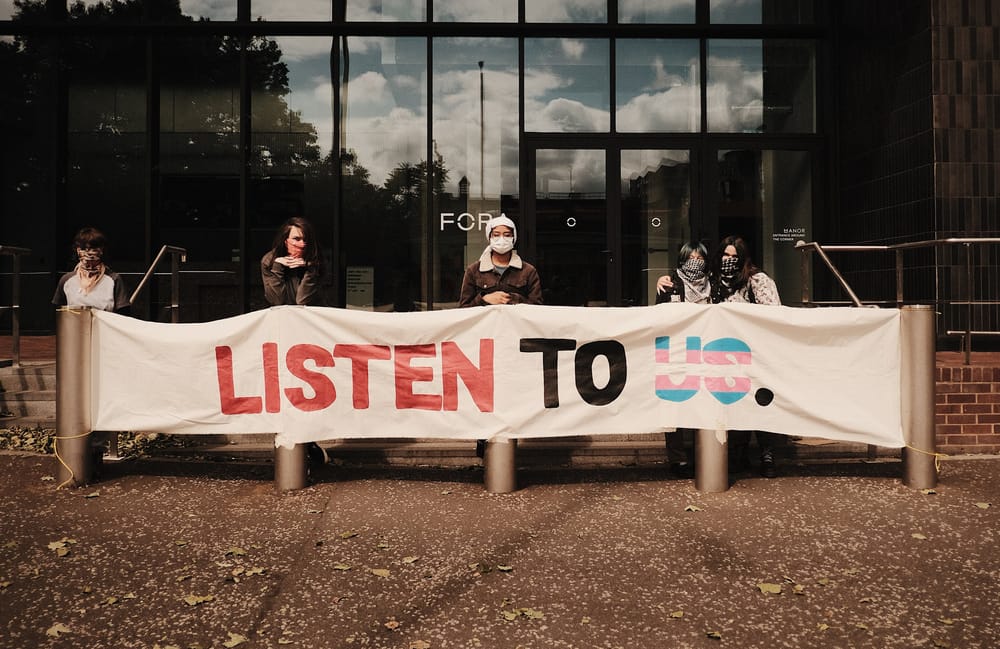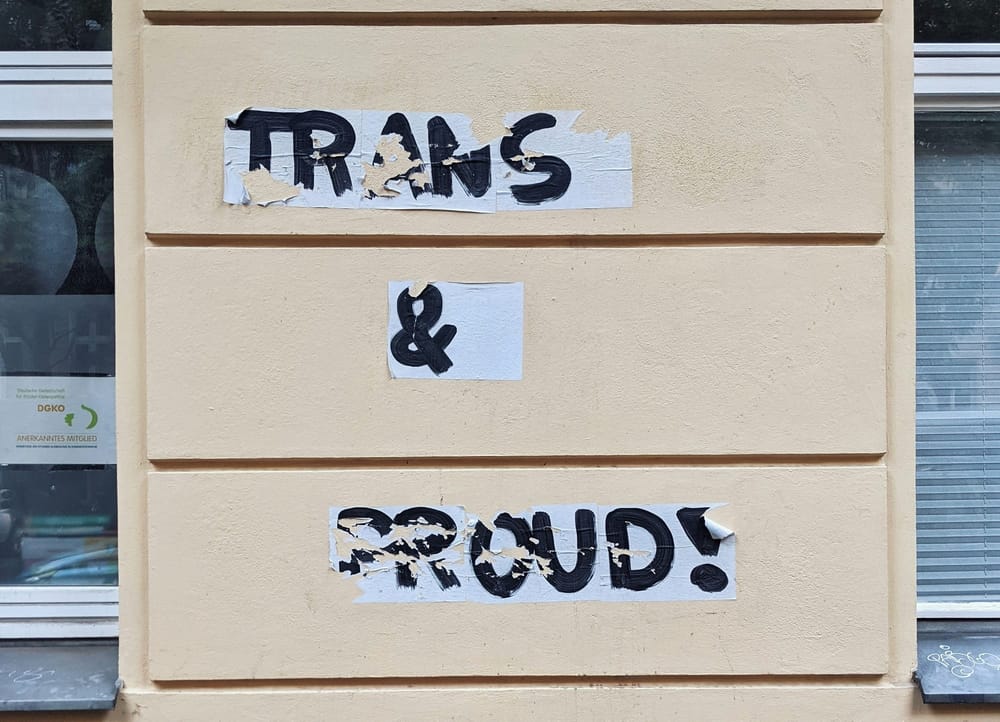The unravelling of the anti-Left alliance
A Twitter spat reveals the breakdown of old allegiances.

On Sunday, a Twitter brawl erupted following the release of a Labour Party campaign ad featuring footage from leader Keir Starmer’s visit to Berlin. Now overshadowed by the release of the Forde Report (commissioned by the party to investigate the contents of an earlier report into Labour’s handling of antisemitism under Jeremy Corbyn, which was leaked to the media in April 2020), the controversy concerned a couple of seconds within an otherwise run-of-the-mill promo video. While the voice-over describes his vision for a Labour government, Starmer, as well as Shadow Foreign Secretary David Lammy, can be seen walking through the Memorial to the Murdered Jews of Europe.
This is considered a faux pas for a reason: using a memorial to the mass murder of Jews at the hands of the Nazi death machine as a backdrop to your campaign ad, especially when it makes no mention of the memorial or the Shoah, is to reduce Holocaust memory to a political prop. This is crass, vulgar and indecent. Regardless of whether it was stupidity or cynicism that led to the inclusion of this footage, Jews are right to feel insulted and Starmer should apologise.
You’d think that would have been the end of it.
Rather than admit the error and apologise, however, Starmer’s allies doubled down. A surprisingly reasonable intervention by the Campaign Against Antisemitism (CAA) was attacked by former Labour MP Ruth Smeeth – one of the most prominent critics of Corbyn for his handling of antisemitism in the party – as “completely disingenuous and deeply unfair.” Lee Harpin, formerly of the Jewish Chronicle, accused another journalist who criticised Starmer of “trying to manufacture a political row that isn’t there”, before calling on the CAA to “come clean about their links to another political party”.
The most galling response came from Margaret Hodge MP, honorary patron of the CAA, who tweeted: “I’m fed up of CAA using antisemitism as a front to attack Labour. Time to call them out for what and who they really are. More concerned with undermining Labour than rooting out antisemitism.” To say this about an organisation of which you are patron is scandalous, but it is also highly significant politically, given that the EHRC investigation into Labour antisemitism was initiated by a CAA complaint.
Understanding the broigus
For a casual observer of Labour party feuds, this Twitter spat would have looked like a bizarro version of 2019: lefties and hardline Zionists in agreement that the Labour leader should apologise for antisemitism, while the Labour Right dismiss it as a factional smear, only for Ian Austin to emerge as the voice of reason! As amusing as this situation may have been, though, it is worth thinking critically about what just happened.
Let’s start with the obvious: Firstly, the Labour Right hypocritically apply different standards to their friends and their opponents. Old news.
Secondly, the shallowness of the defences of Starmer reveals the intellectual feebleness of his allies. For example, academic David Hirsh tried to act as if the campaign video was merely an account of what Starmer got up to on his city-break and so there was nothing below board. Poor effort.
And thirdly, the logic underpinning many of the attacks on the Left during the Labour antisemitism saga, while clearly incoherent at the time, was never earnestly believed by Corbyn’s main detractors and never intended to be in play post-Corbyn. For instance, we were told many times that challenging the obvious motivations of your accusers was inherently a gross act of antisemitism, yet that is exactly what Hodge and Harpin have just done. Likewise, we were told that disputing whether something is antisemitic was itself an equal, if not greater, act of antisemitism. It is a big step forward that the Labour Right now finally admit that these unserious logics are nonsense.
Beyond these trivialities, the significance of this Twitter spat is in exposing a fault-line in the loose but (previously) unified anti-Corbyn coalition. Understanding this requires a closer look at how this coalition functioned.
An unholy alliance
The Labour antisemitism saga was primarily an overlapping set of 3 political battles: the electoral contest between Labour and the Conservatives, the battle between the Labour Left and Right for control of the party, and the battle between the Jewish communal establishment (think BoD, JLC, JLM etc.) and the leftwing minority (think JVL, JSG, Jewdas etc.) over political legitimacy.
Until the Right’s recapture of the Labour leadership in 2021, the reactionary participants in each of these battles – the Jewish communal establishment, the Labour Right and Tory supporters – found themselves on the same side and with mutually-reinforcing priorities: defeat Labour, retake Labour from the Left and bully leftwing Jews into silence. These priorities are nevertheless slightly different and tensions did arise: JLM was criticised for not leaving the party altogether, and anti-Labour activists were cautioned against going too hard on rightwing Labour MPs. But Corbyn as a singular villain was enough of a unifying force.
With Corbyn out and Starmer in, this coalition has now lost most of its usefulness. Crucially, the contradiction between the Labour Right and anti-Labour political actors, such as the CAA, is becoming the principle fault-line in discussions of antisemitism. Tory supporters who were previously applauding Hodge’s verbal abuse of Corbyn are now unsympathetic to her defence of a Starmer-led Labour Party. Conversely, Blairites previously happy to amplify Conservative Party attacks asserting that their own party was institutionally antisemitic are loathe to do so now – as if institutional racism is something that can come and go in a year or two.
The dissonance is especially present among Starmer’s supporters. He was, after all, a senior shadow cabinet member in a party they claim was institutionally antisemitic, and he campaigned for Corbyn – supposedly an incorrigible Jew-hater – to become Prime Minister. Either Corbyn wasn’t that bad or Starmer was directly complicit in an “existential threat to Jewish life”.
A similar contradiction is playing out within the previously unified Jewish communal establishment. Now that the prospect of a Corbyn government has been foreclosed, previously suppressed political contestation is becoming more visible – for instance, the very public squabble between the leadership of the Board of Deputies and the rightwing splinter group led by the Board’s former VP, Gary Mond.
While there are several drivers of this increasing polarisation, the debate over the proper attitude towards the new Labour Party is going to heat up considerably as the next General Election approaches and pro-Tory elements turn on their Labour Right comrades. You can see a preview of this in the criticism and defence of Starmer’s Berlin video – it’s partially a fight over who in the community has the authority to declare a politician antisemitic.
Lessons learned
So where do we go from here?
The immediate conclusion is that the Labour antisemitism saga shows no sign of ending. The broader phenomenon of reactionaries mendaciously claiming the mantle of anti-racism to attack anti-racists is not going away. It is as crucial as ever for socialists – in particular socialist Jews – to be clear-headed as to the correct response to antisemitism as well as to the cynical weaponisation of antisemitism for political ends.
Regarding the Starmer memorial fallout specifically, we must not get carried away and end up replicating the same incoherent and ultimately destructive logic being used against the Left. We gain nothing by demanding that Starmer resign for this blunder or his trite memorial guestbook message; doing so would inadvertently legitimise a flat conception of antisemitism as merely a set of tropes and faux pas, while privileging antisemitism as a uniquely dangerous and disqualifying racism.
Reducing the fight against antisemitism to an unserious rhetorical game – within a bourgeois party in the imperial core – or separating it from the broader material struggle against racism are fundamentally losing strategies for principled anti-racists.
As the release of the Forde Report reopens these questions, it is undoubtedly helpful that Starmer and his friends chose this moment to remind us of their cynicism as well as provide an insight into the deeper political dynamics in motion.▼
Yirmeyahu Wedgewood is a rabbinical student at the Frankfurt School of Life, and a figment of the Jewish right’s imagination.
Author
Yirmeyahu Wedgewood is a pseudonym.
Sign up for The Pickle and New, From Vashti.
Stay up to date with Vashti.



